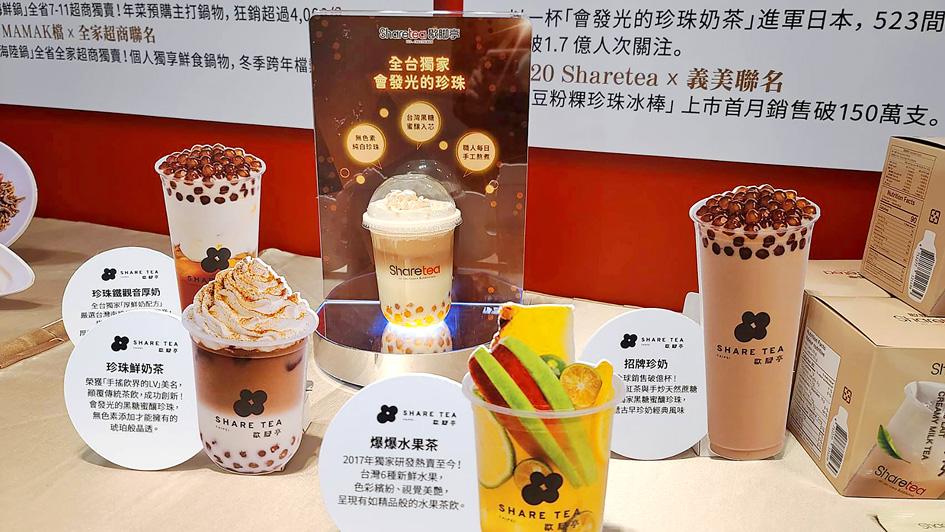Lian Fa International Dining Business Corp (聯發國際餐飲), which owns bubble tea brand Sharetea (歇腳亭), is to launch an initial public offering (IPO) on the Taipei Exchange (TPEX) on Friday, moving up from the Emerging Stock Board.
The company started trading its shares on the Emerging Stock Board on Jan. 7 last year, and closed at NT$145 on Friday.
Sharetea started as a black tea stall on Taipei’s Nanyang Street in 1992 and established Lian Fa in 2004. It now has more than 350 outlets in 13 markets worldwide, including Canada, the Czech Republic, Hong Kong, Indonesia, the Philippines, Singapore, the United Arab Emirates (UAE), the US and Vietnam.

Photo: CNA
Its IPO prospectus showed that it operates 125 Sharetea outlets in the US, its largest market, and 44 shops in Hong Kong, the second-largest.
The company runs 22 stores in Taiwan.
Lian Fa is upbeat about the global bubble tea market, as it expects a compound annual growth rate of 9 percent over the next five years, with sales expected to reach US$4.3 billion in 2027 from US$2.32 billion in 2020.
In the first nine months of last year, Lian Fa posted NT$614 million in consolidated sales, up 31 percent from a year earlier.
Net profit hit NT$85.57 million (US$3.1 million), or earnings per share of NT$5.52, compared with a profit of NT$19.3 million, or earnings per share of NT$1.47, for the entire 2020, it said.
Lian Fa president Lai Po-yu (賴伯宇) said in the statement that Sharetea’s global expansion plan focuses on the US.
The firm expects the number of US stores across 24 states to rise to 131 by the end of the first quarter, Lai said, adding that the firm is preparing to open more than 40 new Sharetea outlets in the country, including stores in one state where it is not yet present.
Prices per cup at Sharetea stores are from US$5 to US$7, higher than coffee at Starbucks, but many US consumers favor the Taiwanese brand, Lian Fa said, adding that while about 50 percent of its US outlets are run by ethnic Chinese franchises holders, only 30 percent of its US customers are ethnic Chinese.
The company is also seeking to expand in the Middle East, with a planned outlet in Kuwait, after it opened its first of four outlets in Dubai, UAE, in 2012.
Lian Fa has signed an agreement with a partner in Kuwait, where its outlet would be the only international hand-shaken beverage brand store, it said.

UNCERTAINTY: Innolux activated a stringent supply chain management mechanism, as it did during the COVID-19 pandemic, to ensure optimal inventory levels for customers Flat-panel display makers AUO Corp (友達) and Innolux Corp (群創) yesterday said that about 12 to 20 percent of their display business is at risk of potential US tariffs and that they would relocate production or shipment destinations to mitigate the levies’ effects. US tariffs would have a direct impact of US$200 million on AUO’s revenue, company chairman Paul Peng (彭雙浪) told reporters on the sidelines of the Touch Taiwan trade show in Taipei yesterday. That would make up about 12 percent of the company’s overall revenue. To cope with the tariff uncertainty, AUO plans to allocate its production to manufacturing facilities in

TAKING STOCK: A Taiwanese cookware firm in Vietnam urged customers to assess inventory or place orders early so shipments can reach the US while tariffs are paused Taiwanese businesses in Vietnam are exploring alternatives after the White House imposed a 46 percent import duty on Vietnamese goods, following US President Donald Trump’s announcement of “reciprocal” tariffs on the US’ trading partners. Lo Shih-liang (羅世良), chairman of Brico Industry Co (裕茂工業), a Taiwanese company that manufactures cast iron cookware and stove components in Vietnam, said that more than 40 percent of his business was tied to the US market, describing the constant US policy shifts as an emotional roller coaster. “I work during the day and stay up all night watching the news. I’ve been following US news until 3am

COLLABORATION: Given Taiwan’s key position in global supply chains, the US firm is discussing strategies with local partners and clients to deal with global uncertainties Advanced Micro Devices Inc (AMD) yesterday said it is meeting with local ecosystem partners, including Taiwan Semiconductor Manufacturing Co (TSMC, 台積電), to discuss strategies, including long-term manufacturing, to navigate uncertainties such as US tariffs, as Taiwan occupies an important position in global supply chains. AMD chief executive officer Lisa Su (蘇姿丰) told reporters that Taiwan is an important part of the chip designer’s ecosystem and she is discussing with partners and customers in Taiwan to forge strong collaborations on different areas during this critical period. AMD has just become the first artificial-intelligence (AI) server chip customer of TSMC to utilize its advanced

Six years ago, LVMH’s billionaire CEO Bernard Arnault and US President Donald Trump cut the blue ribbon on a factory in rural Texas that would make designer handbags for Louis Vuitton, one of the world’s best-known luxury brands. However, since the high-profile opening, the factory has faced a host of problems limiting production, 11 former Louis Vuitton employees said. The site has consistently ranked among the worst-performing for Louis Vuitton globally, “significantly” underperforming other facilities, said three former Louis Vuitton workers and a senior industry source, who cited internal rankings shared with staff. The plant’s problems — which have not